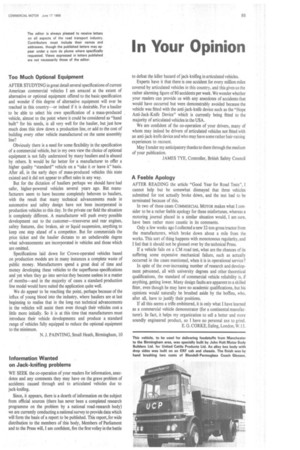Information Wanted on Jack-knifing problems
Page 87

If you've noticed an error in this article please click here to report it so we can fix it.
WE SEEK the co-operation of your readers for information, anecdotes and any comments they may have on the grave problem of accidents caused through and to articulated vehicles due to jack-knifing.
Since, it appears, there is a dearth of information on the subject from official sources (there has never been a completed research programme on the problem by a national road-research body) we are currently conducting a national survey to provide data which will form the basis of a report to be published. This report, for wide distribution to the members of this body, Members of Parliament and to the Press will, I am confident, fire the first volley in the battle to defeat the killer hazard of jack-knifing in articulated vehicles.
Experts have it that there is one accident for every million miles covered by articulated vehicles in this country, and this gives us the rather alarming figure of 80 accidents per week. We wonder whether your readers can provide us with any anecdotes of accidents that would have occurred but were demonstrably avoided because the vehicle was fitted with the anti-jack-knife device such as the "Hope Anti-Jack-Knife Device" which is currently being fitted to the majority of articulated vehicles in the USA.
We are confident of the co-operation of your drivers, many of whom may indeed be drivers of articulated vehicles not fitted with an anti-jack-knife device and who may have some rather hair-raising experiences to recount.
May I tender my anticipatory thanks to them through the medium of your publication.
JAMES TYE, Controller, British Safety Council
A Feeble Apology
AFTER READING the article "Good Year for Road Tests", I cannot help but be somewhat dismayed that three vehicles submitted for test actually broke down, and the test had to be terminated because of this.
In two of these cases COMMERCIAL MOTOR makes what I consider to be a rather feeble apology for these misfortunes, whereas a motoring journal placed in a similar situation would, I am sure, have been rather more caustic in its comments.
Only a few weeks ago I collected a new 32-ton-gross tractor from the manufacturers, which broke down about a mile from the works. This sort of thing happens with monotonous regularity, and I feel that it should not be glossed over by the technical Press.
If a vehicle fails on a CM road test, what are the chances of its suffering some expensive mechanical failure, such as actually occurred in the cases mentioned, when it is in operational service?
In spite of the ever-increasing number of research and development personnel, all with university degrees and other theoretical qualifications, the standard of commercial vehicle reliability is, if anything, getting lower. Many design faults are apparent to a skilled fitter, even though he may have no academic qualifications, but his opinions would naturally be brushed aside by the boffins, who, after all, have to justify their positions.
If all this seems a trifle embittered, it is only what I have learned as a commercial vehicle demonstrator (for a continental manufacturer). In fact, it helps my organization to sell a better and more soundly engineered product, so I have no personal axe to grind.
E. G. CORKE, Ealing, London. W.13.




















































































































































